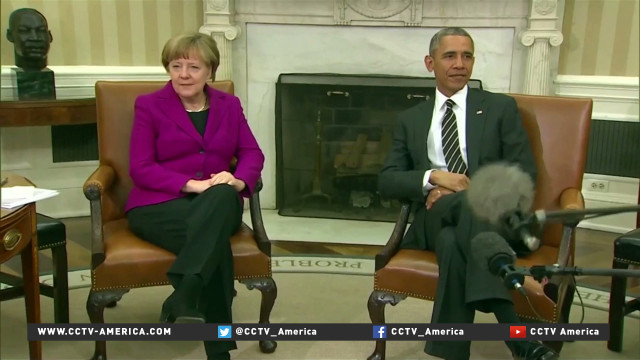The European Union has called on Germany to support the Transatlantic Trade and Investment Partnership free trade agreement. Officials say that without TTIP, The EU will lose some of its global influence. The bloc’s most powerful member stands accused of holding it back.
CCTV’s Guy Henderson reported this story from Berlin.

Germany slows progress on TTIP trade agreement
The European Union has called on Germany to support the Transatlantic Trade and Investment Partnership free trade agreement. Officials say that without TTIP, The EU will lose some of its global influence. The bloc's most powerful member stands accused of holding it back.According to the bloc’s Trade Minister Cecilia Malmstrom the EU must finalize a trade deal with the United States or accept a diminishing global role.
Malmstrom has been in Berlin Monday, trying to convince the EU’s most powerful member of the benefits of the Transatlantic Trade and Investment Partnership to negotiate.
The TTIP deal could set a new precedent, the deal would allow companies like Limmer Laser to sell their 4th generation CO2 laser to U.S. buyers.
“The biggest benefit would be bigger market access, which would be beneficial not only to us, but also to the U.S.,” Managing Director of Limmer Laser Bjorn-Frederic Limmer said. Because in the end, if we have a better opportunity to bring in better technology into certain regions, that’s not a bad thing for anybody.”
Medical supplies are just a start.
The TTIP aims to streamline trade between the U.S. and Europe in everything from cars to cosmetics.
Three months into the job, the EU’s new trade commissioner is having a tough time convincing one country in particular.
40 percent of Germans still oppose TTIP-support.
In Berlin on Monday, the EU trade commissioner picked a theme that resonates often.
“The role of Europe in the world is diminishing economically. If we want to be able to defend the values and standards that we treasure, we need to find allies,” Malmstrom said. “Even if we have our disagreements with the U.S., working together to set standards if it comes to child labor, climate, regulatory standards, we have the possibility to set them and for them to be globally valid. Because if we don’t set them. Someone else will.”
Unions are amongst the skeptics who believe certain sectors shouldn’t be opened to the full force of the market.
“They are targeting the liberalisation of public services – public procurement and things like this. And we see a threat for the high level of of social security, for example, in European states,” Sabine Reiner of the Verdi Workers Union said.
Not even talks at the highest level earlier in February could narrow the gap.
While it is an EU-wide deal, it needs the German chancellor Angela Merkel’s approval.
The deal may add up to half a percentage point to the European Union’s GDP every year. The problem seems to be getting Europe’s politicians to speak with one voice, if they don’t do so soon, the American election campaign will be ramping up and the deal could be put on the back-burner.
 CGTN America
CGTN America
